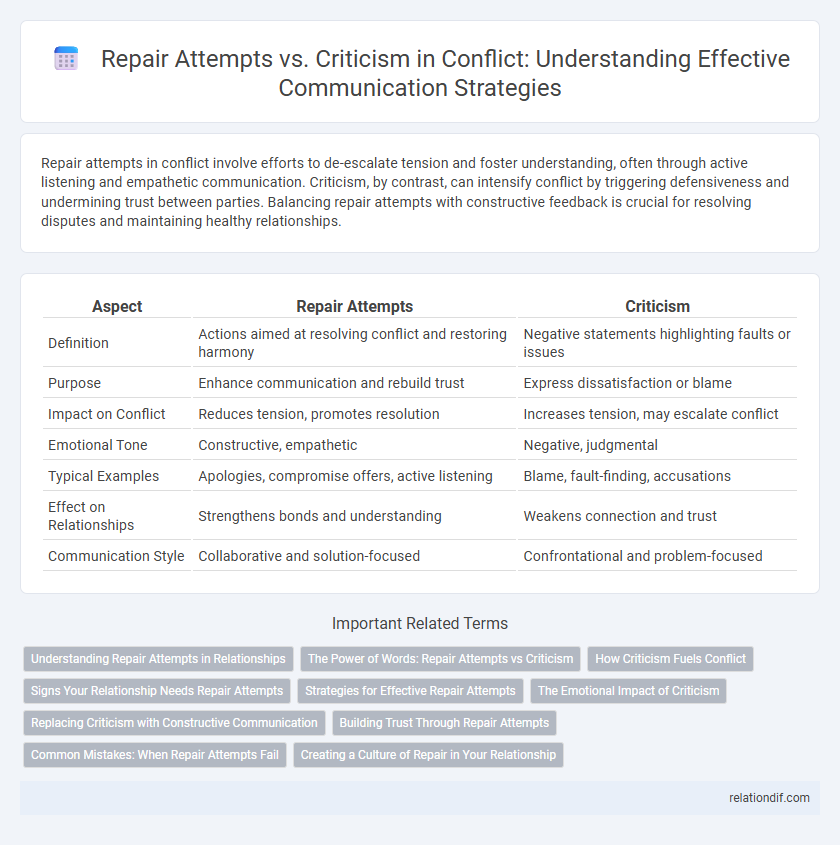Repair attempts in conflict involve efforts to de-escalate tension and foster understanding, often through active listening and empathetic communication. Criticism, by contrast, can intensify conflict by triggering defensiveness and undermining trust between parties. Balancing repair attempts with constructive feedback is crucial for resolving disputes and maintaining healthy relationships.
Table of Comparison
| Aspect | Repair Attempts | Criticism |
|---|---|---|
| Definition | Actions aimed at resolving conflict and restoring harmony | Negative statements highlighting faults or issues |
| Purpose | Enhance communication and rebuild trust | Express dissatisfaction or blame |
| Impact on Conflict | Reduces tension, promotes resolution | Increases tension, may escalate conflict |
| Emotional Tone | Constructive, empathetic | Negative, judgmental |
| Typical Examples | Apologies, compromise offers, active listening | Blame, fault-finding, accusations |
| Effect on Relationships | Strengthens bonds and understanding | Weakens connection and trust |
| Communication Style | Collaborative and solution-focused | Confrontational and problem-focused |
Understanding Repair Attempts in Relationships
Repair attempts in relationships serve as crucial efforts to de-escalate conflict and restore emotional connection, often involving apologies, humor, or physical gestures. Understanding these attempts requires recognizing the intent behind actions and the timing within the conflict cycle to foster empathy and effective communication. Failure to acknowledge repair attempts can intensify criticism, leading to increased relational tension and emotional distance.
The Power of Words: Repair Attempts vs Criticism
Repair attempts in conflict emphasize empathy and understanding, fostering connection through positive communication. Criticism often triggers defensiveness, escalating tension and widening divides. Words wield immense power to either heal rifts or deepen conflicts, shaping relational dynamics significantly.
How Criticism Fuels Conflict
Criticism often intensifies conflict by triggering defensive reactions and escalating emotional responses, which hinder effective communication and resolution efforts. Negative feedback can undermine trust, create resentment, and deepen divisions between parties, making repair attempts less successful. Understanding how criticism fuels conflict is crucial for developing strategies that promote empathy, constructive dialogue, and collaborative problem-solving.
Signs Your Relationship Needs Repair Attempts
Frequent misunderstandings and unresolved disagreements indicate your relationship needs repair attempts to restore trust and communication. Experiencing emotional distance or diminished intimacy often signals underlying issues requiring attention and collaborative effort. Recognizing patterns of blame and defensiveness helps identify when it's critical to seek constructive conflict resolution strategies.
Strategies for Effective Repair Attempts
Effective repair attempts in conflict prioritize active listening, empathetic responses, and clear communication to de-escalate tensions and rebuild trust. Employing non-defensive language and acknowledging the other party's feelings fosters mutual understanding and reduces resistance. Strategic timing and sincere apologies enhance the likelihood of successful conflict resolution and long-term relationship repair.
The Emotional Impact of Criticism
Criticism during conflict often triggers intense emotional responses such as shame, anger, or defensiveness, hindering effective communication and repair attempts. Emotional wounds from harsh criticism can create barriers to reconciliation by fostering resentment and reducing empathy between parties. Understanding the emotional impact of criticism is crucial for developing more compassionate conflict resolution strategies that facilitate healing and restore trust.
Replacing Criticism with Constructive Communication
Replacing criticism with constructive communication transforms conflict resolution by fostering understanding and collaboration. Encouraging specific feedback and active listening reduces defensiveness and builds trust between parties. Effective communication strategies emphasize problem-solving and mutual respect, leading to sustainable repair attempts in strained relationships.
Building Trust Through Repair Attempts
Repair attempts during conflict, such as apologies, validating emotions, and offering solutions, play a crucial role in building trust between parties. Consistent and genuine repair efforts reduce relational tensions and signal commitment to mutual understanding and resolution. Despite occasional criticism, ongoing repair attempts foster emotional safety and strengthen the foundation for reconciliation.
Common Mistakes: When Repair Attempts Fail
Repair attempts in conflicts often fail due to common mistakes such as defensiveness, miscommunication, and insincerity. Failing to acknowledge the other party's feelings or dismissing concerns as trivial can escalate tensions instead of resolving them. Effective conflict repair requires active listening, genuine empathy, and timely, clear expressions of accountability.
Creating a Culture of Repair in Your Relationship
Creating a culture of repair in your relationship involves actively acknowledging mistakes and committing to constructive dialogue after conflicts. Repair attempts, such as expressing empathy, offering apologies, and validating feelings, significantly reduce relational tension and build trust over time. Consistent practice of these behaviors transforms criticism into opportunities for growth and deeper connection, fostering long-term emotional resilience.
Repair attempts vs criticism Infographic

 relationdif.com
relationdif.com